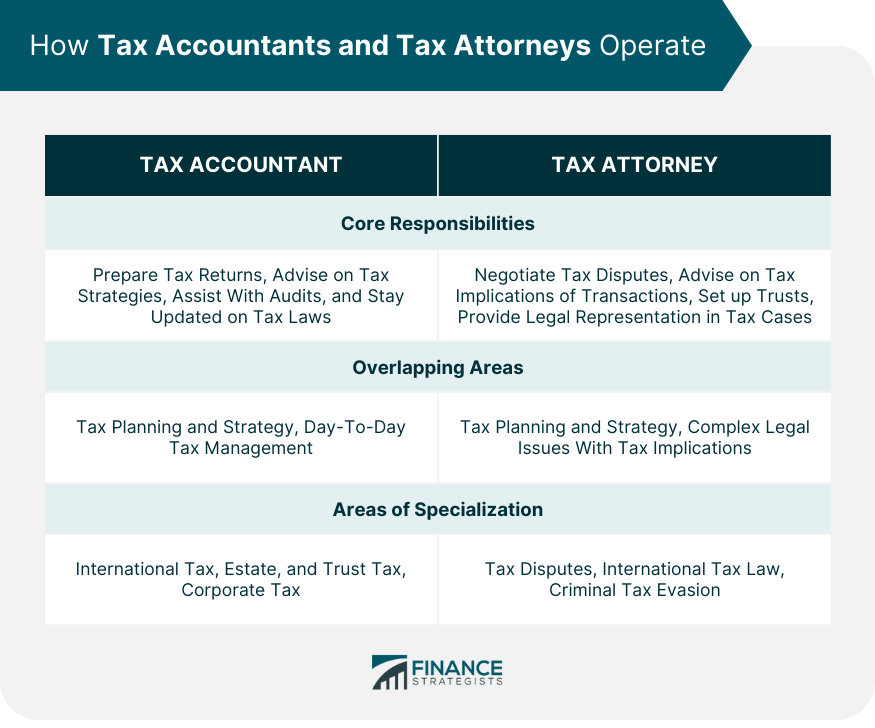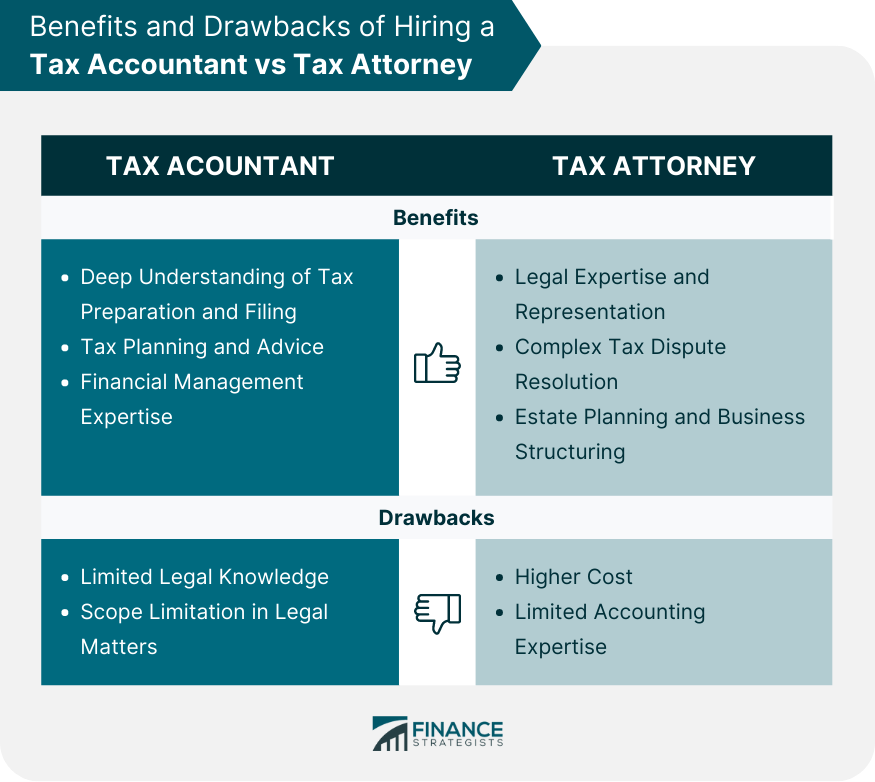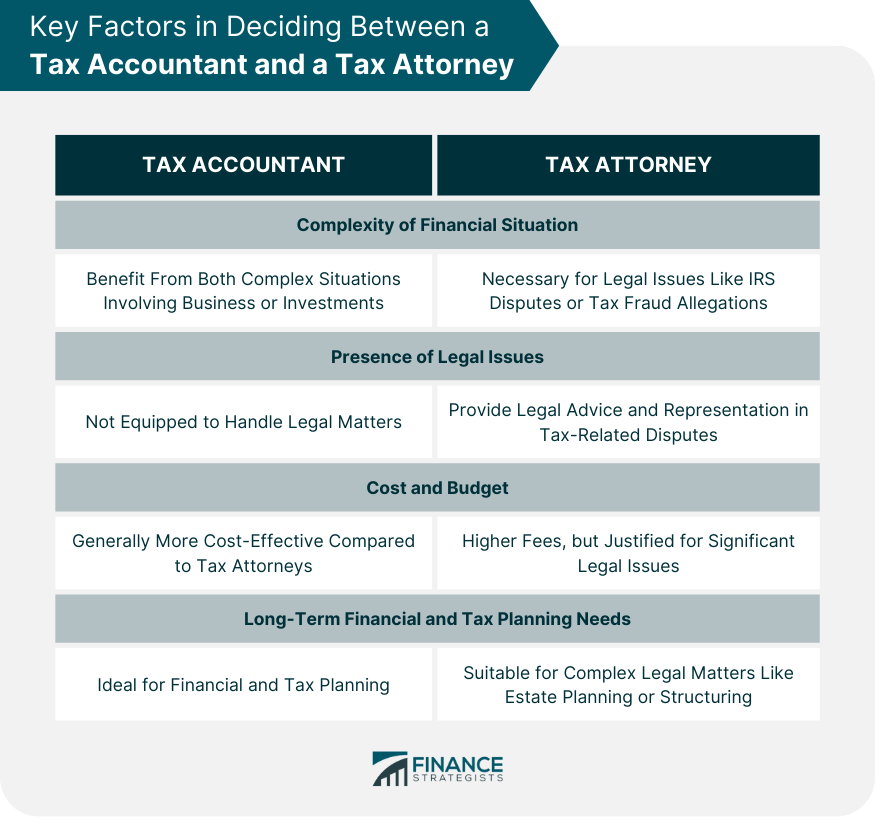A tax accountant is a finance professional who specializes in helping individuals and businesses manage their taxes. They offer a wide range of services, such as tax planning, preparation of tax returns, and ensuring compliance with state and federal tax laws. On the other hand, a tax attorney is a lawyer who specializes in the complex field of tax law. They are often involved in resolving tax disputes, structuring business entities, estate planning, and providing legal representation in cases of tax fraud or evasion. Tax accountants play a crucial role in helping taxpayers understand and comply with their tax obligations, thereby minimizing the risk of errors that could lead to penalties. They also provide valuable advice on how to maximize deductions and credits to save on taxes. Tax attorneys are crucial when dealing with legal matters related to taxes. They are particularly important when dealing with disputes with tax authorities, planning complex business transactions, or dealing with allegations of tax fraud or evasion. The main responsibilities of a tax accountant include preparing tax returns, providing advice on tax reduction strategies, assisting with audits, and staying updated on new tax laws and regulations. They often work closely with their clients throughout the year to ensure compliance and optimize their financial situation for tax purposes. Tax attorneys, on the other hand, deal primarily with legal issues. This can involve negotiating with tax authorities in case of a dispute, providing advice on the tax implications of business transactions, setting up trusts for estate planning, and providing legal representation for clients accused of tax fraud or evasion. Both tax accountants and attorneys can assist with tax planning and strategy, but their approaches and areas of expertise may differ. Tax attorneys often handle more complex issues that have significant legal implications, while tax accountants are typically more involved in the day-to-day management of taxes. Tax accountants might specialize in areas such as international tax, estate and trust tax, or corporate tax, while tax attorneys might specialize in areas such as tax disputes, international tax law, or criminal tax evasion. You should consider hiring a tax accountant if you have complex tax returns, own a business, or need advice on tax planning. A tax accountant can also be helpful if you've made a significant financial change in your life, such as selling property, starting a business, or retiring. You should seek the advice of a tax attorney if you're facing a legal issue related to your taxes, such as a dispute with the IRS, allegations of tax fraud, or complex estate planning. A tax attorney is also necessary if you're planning complex business transactions with significant tax implications. When deciding between a tax accountant and a tax attorney, consider the complexity of your situation, the nature of the issues you're dealing with, and your budget. If you're primarily dealing with tax preparation and planning, a tax accountant may be sufficient. However, if you're facing legal issues related to your taxes, you will likely need the services of a tax attorney. Tax accountants are trained to understand the complexities of tax law and how it applies to both individuals and businesses. They can assist with tax preparation and filing, ensuring you take advantage of all applicable deductions and credits. Tax accountants provide advice on how to plan for future taxes, reduce tax liability, and stay compliant with tax laws. They are also familiar with the latest changes in tax regulations, ensuring that their client's financial strategies align with current laws. In addition to their tax expertise, tax accountants often have a strong understanding of finance and accounting. This allows them to offer broader financial advice and services, such as budgeting, financial planning, and investment advice. The primary benefit of hiring a tax attorney is their legal expertise. They understand the intricacies of tax law and can provide guidance and representation in complex legal matters involving taxes. If you're in a dispute with the IRS or a state tax agency, a tax attorney can negotiate on your behalf. They can help to reduce penalties, set up payment plans, or even get tax debts discharged in some cases. Tax attorneys are often involved in estate planning, including setting up trusts and estates and advising on the tax implications of inheritance. They can also provide advice on the tax implications of different business structures and assist with structuring complex business transactions. While tax accountants are experts in tax preparation and planning, they may not have the legal knowledge needed to handle complex legal issues. For example, they cannot represent you in court if you're charged with tax fraud. Tax accountants is primarily focused on the financial aspects of tax compliance, which means they may not be equipped to handle issues that fall outside this scope, such as negotiating with tax authorities in a dispute or structuring complex business transactions. Tax attorneys often charge higher fees than tax accountants. This is due to their legal training and the complexity of the issues they handle. However, the cost could be justified if you're dealing with serious legal issues related to your taxes. While tax attorneys are well-versed in tax law, they may not have the same level of expertise in accounting or financial management as tax accountants. This means they may not be as equipped to assist with tasks like tax preparation and filing, financial planning, or day-to-day financial management. If your financial situation is complex, such as owning a business or having significant investments, you may benefit from the services of both a tax accountant and a tax attorney. They can work together to ensure both your financial and legal bases are covered. If you're dealing with legal issues related to your taxes, such as a dispute with the IRS or allegations of tax fraud, you'll likely need a tax attorney. They can provide legal advice and representation that a tax accountant cannot. Consider your budget when deciding between a tax accountant and a tax attorney. While tax attorneys typically charge higher fees, the cost can be justified if you're dealing with significant legal issues related to your taxes. If your primary need is financial and tax planning, a tax accountant may be your best bet. However, if you're dealing with complex legal issues related to taxes, such as estate planning or complex business structuring, a tax attorney may be more suitable. Deciding between a tax accountant and a tax attorney is often contingent on the complexity of one's financial situation and the presence of any legal issues related to taxes. A tax accountant is adept in tax planning, preparation, compliance, and financial advice, making them a go-to resource for routine tax and financial matters. Conversely, a tax attorney excels in tax law, providing critical guidance and representation for tax disputes, tax fraud, estate planning, and complex business transactions. While tax attorneys might come at a higher cost, they offer an indispensable service when facing significant legal tax matters. Nevertheless, both professionals can collaborate effectively to cover the spectrum of your financial and legal needs, providing a holistic approach to tax management. Understanding the nuances of what each professional offers will empower you to make informed decisions when navigating tax-related matters.Tax Accountant vs Tax Attorney Overview
How Tax Accountants and Tax Attorneys Operate
Core Responsibilities of a Tax Accountant
Core Responsibilities of a Tax Attorney
Overlapping Areas of Work
Areas of Specialization

Process of Engaging a Tax Accountant and a Tax Attorney
When to Consult a Tax Accountant
When to Consult a Tax Attorney
Considerations for Choosing Between a Tax Accountant and a Tax Attorney
Benefits of Hiring a Tax Accountant
Deep Understanding of Tax Preparation and Filing
Tax Planning and Advice
Financial Management Expertise
Benefits of Hiring a Tax Attorney
Legal Expertise and Representation
Complex Tax Dispute Resolution
Estate Planning and Business Structuring
Drawbacks of Hiring a Tax Accountant
Limited Legal Knowledge
Scope of Work Limitation
Drawbacks of Hiring a Tax Attorney
Higher Cost
Limited Accounting Expertise

Key Factors in Deciding Between a Tax Accountant and a Tax Attorney
Complexity of Financial Situation
Presence of Legal Issues
Cost and Budget
Long-Term Financial and Tax Planning Needs

The Bottom Line
Tax Accountant vs Tax Attorney FAQs
A tax accountant specializes in preparing tax returns, tax planning, and providing financial management advice. A tax attorney, on the other hand, provides legal guidance on tax matters, handles tax disputes, assists in estate planning and complex business transactions, and can provide representation in cases of tax fraud or evasion.
If your needs primarily revolve around tax preparation, filing, and financial planning, a tax accountant would likely be sufficient. However, if you're dealing with legal issues related to your taxes, such as disputes with tax authorities or allegations of tax fraud, you should consider hiring a tax attorney.
No, a tax accountant cannot represent you in court. If you're facing a situation that requires legal representation, such as a tax dispute or allegations of tax fraud, you would need a tax attorney.
Tax attorneys often charge higher fees due to their legal training and the complexity of the issues they handle. Legal matters involving taxes often require a significant amount of expertise and experience, which is reflected in the cost.
Yes, a tax accountant and tax attorney can collaborate. This is often beneficial if you have a complex financial situation that requires both financial and legal expertise. They can work together to ensure both your financial and legal needs are addressed.
True Tamplin is a published author, public speaker, CEO of UpDigital, and founder of Finance Strategists.
True is a Certified Educator in Personal Finance (CEPF®), author of The Handy Financial Ratios Guide, a member of the Society for Advancing Business Editing and Writing, contributes to his financial education site, Finance Strategists, and has spoken to various financial communities such as the CFA Institute, as well as university students like his Alma mater, Biola University, where he received a bachelor of science in business and data analytics.
To learn more about True, visit his personal website or view his author profiles on Amazon, Nasdaq and Forbes.











